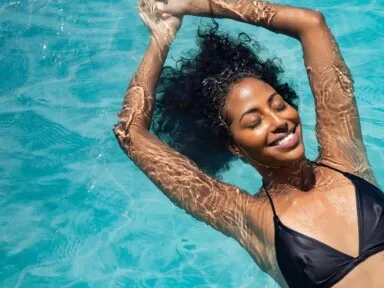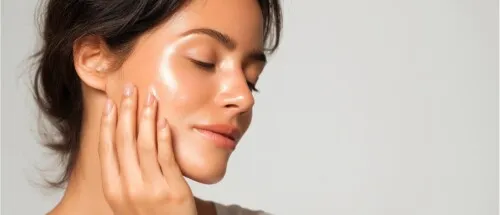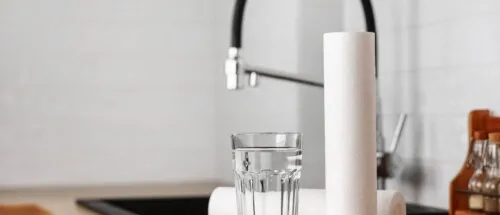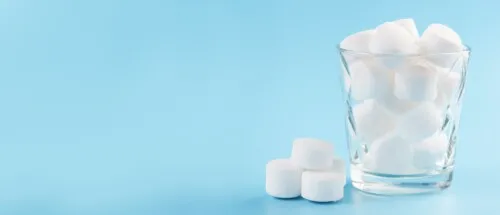When we encounter chlorine in everyday life, it’s usually because we’re heading to a pool or hot tub. This chemical is highly effective at killing bacteria and making water safe. However, it has a reputation. Many people believe chlorine can be damaging to your hair. But is chlorine bad for your hair? And if it is, what can you do to protect it?
In this article:
- What is Chlorine and Why is It Used?
- Effects of Chlorine on Hair
- How to Protect Your Hair from Chlorine Damage
- How to Repair Hair Damaged by Chlorine
- Is Chlorine Bad for Your Hair?
- Frequently Asked Questions
What is Chlorine and Why is It Used?
As previously mentioned, chlorine is a powerful cleaning chemical. It is commonly used to kill bacteria and viruses in swimming pools or disinfect surfaces. This highly potent cleaning agent is known for its ability to knock out dangerous microorganisms, yet it’s safe enough in small quantities in water for humans to swim in.
However, even in those small quantities, it’s generally bad news for your hair. Have you ever wondered why professional swimmers wear swim caps? A big reason is to protect their hair from the damaging effects of chlorine. Taking a cue from them can be beneficial. After all, they spend a lot of time in that water.
Effects of Chlorine on Hair
Damages Hair
When chlorine interacts with human hair, the chemical changes it. For example, chlorine interacting with other pool chemicals can weaken hair, causing split ends. In addition, chlorine can irritate the skin, leading to scalp dryness and flakiness.
Strips Hair of Natural Oils
Beyond weakening hair, chlorine strips it of the natural oils produced by the scalp to keep it healthy. Without that necessary and natural oil, hair can become brittle and dry. Although your scalp will start producing oil again even after chlorine exposure, the best way to avoid long-term damage is to rinse any remaining chlorine residue out of your hair as soon as you’re out of the water.
Impact on Color-Treated Hair
Color-treated hair contains chemical dyes. When those dyes encounter chlorine, they react chemically. That reaction often causes the dye molecules to oxidize, causing irreparable damage to the color itself. This can cause the color to wash out, fade, or even change. For instance, chlorine is known to make blonde hair appear brassy and dramatically fade shades of purple.
Turns Hair Green
There is a common belief that chlorine can make hair turn green. Although pool water can cause this, chlorine is not the cause–copper is. Many algaecides that keep algae from accumulating in pools contain copper, which can turn hair green. The greenifying effect is especially noticeable in lighter hair colors, notably blondes. Even natural colors can get a green tint from copper in pools.
How to Protect Your Hair from Chlorine Damage
Rinse Your Hair Before and After Swimming
It is vital to rinse your hair with fresh, clean water before and after swimming in chlorine-treated water. This makes it harder for the chlorine molecules to bind to your hair strands, reducing the damage. Regardless of how long or how often you go swimming, this step is crucial in your hair care routine.
Use Swim Caps and Protective Gear
Wearing a swim cap while swimming is a terrific way to protect your hair from chlorine damage. The head covering creates a barrier between your hair and the chlorinated pool, making it more difficult for chlorine to reach your vulnerable scalp and hair.
Use Hair Products Designed for Chlorine Exposure
Chlorine-defense hair products, such as AquaGuard Pre-Swim Hair Defense, can be applied before entering chlorine-treated water to create a protective barrier. This stay-in product creates a barrier between the chlorine and your hair, similar to how a swim cap protects you, but without the bulk of protective gear.
How to Repair Hair Damaged by Chlorine
Deep Conditioning Treatments
After your hair is damaged by chlorine, one of the best ways to reinvigorate it is to treat it with a deep leave-in conditioner. These post-swim treatments are formulated with rich, moisturizing ingredients like shea butter or argan oil to rehydrate hair down to the cuticle. A hair mask may also include protein complexes to help hair become strong again.
Clarifying Shampoos
Clarifying shampoo, made specifically to purify hair and scalp by removing impurities, can be an incredible treatment for chlorine-damaged hair. It helps remove residual chemical buildup, refreshing hair with powerful ingredients like hyaluronic acid. However, keep in mind that clarifying shampoos can also strip hair color and irritate scalps if used too frequently.
Natural Remedies for Hair Repair
Instead of a store-bought hair treatment, apply coconut oil or olive oil to your hair to create a barrier. This won’t completely prevent chlorine damage, but it can serve as a preventative measure. If your hair has already been exposed to chlorine, rinse it with diluted apple cider vinegar to restore your scalp’s pH balance, or use aloe vera to re-moisturize.
Is Chlorine Bad for Your Hair?
Ultimately, yes–chlorine is bad for your hair. For all the good it does in pools and hot tub spas, it doesn’t benefit your hair’s health. That’s why water filtration, even with tap water, can help reduce any chlorine present in your home’s water. Through home water purification systems with Leaf Home, you can shower or take a bath knowing that your hair will be healthier! Plus, you can drink and cook with your tap water, which will be crisper from the filtration. Our experts are always happy to lend a hand with your water solutions and home water testing.
Frequently Asked Questions
Can Chlorine Cause Hair Loss?
While chlorine can damage the scalp and hair, it isn’t known to cause hair loss directly. However, it can cause breakage, dryness, and split ends, so it’s a good idea to protect your hair when you swim to help prevent further damage.
Is Chlorine Bad for Curly Hair?
Chlorine is bad for all hair types, though it creates unique problems for people with curly hair. The chemical dries out curls, leading to frizz and tangling. And, because curly hair is typically more porous, it easily absorbs more chlorine, which can further weaken hair strands.
Does Chlorine Affect Hair Growth?
No, chlorine isn’t known to affect hair growth. Chlorine can make hair dry and brittle, but it shouldn’t inhibit its growth, even if it leads to scalp damage.
How Do I Protect My Hair From Chlorinated Water?
Swim caps and pre-swim treatments are the best way to help protect your hair from chlorinated water. These barriers are designed to create a shield between the chlorine in the water and your hair, helping prevent damage. You can also keep your hair out of the water if you don’t have access to any protective gear.
How Can I Repair My Hair After Chlorine Damage?
Using deep conditioning treatments or clarifying shampoos is the best way to help repair chlorine damage to your hair. Deep conditioners replenish moisture stripped from hair, while clarifying shampoos help eliminate any remaining chlorine residue still bound to your hair.



